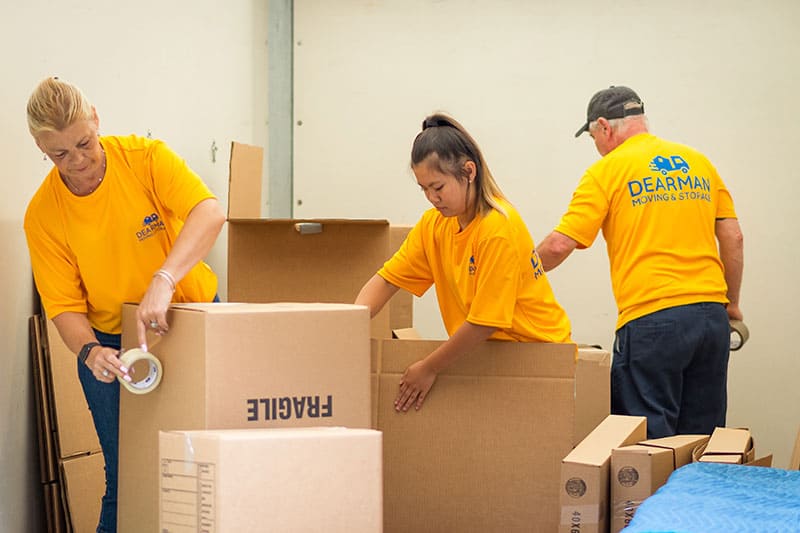Understanding the Inclusions of moving and Freight Forwarding in the World of Worldwide and residential Delivery
Guiding through the intricacies of moving and Freight forwarding can be challenging. Both processes include unique procedures and needs that are essential for successful transportation. Recognizing the differences in logistics, documentation, and threat monitoring is essential for people and businesses alike. This expertise can greatly affect the efficiency and safety of deliveries. Many are unaware of the specific parts that influence the overall experience and end results. What elements should one consider to guarantee a smooth transition?
The Basics of moving and Freight Forwarding
moving and Freight forwarding are essential parts of the global logistics market. They help with the transfer of items and individual items across worldwide and residential boundaries. moving mostly involves the moving of families or individuals, encompassing residential and business needs. It generally includes packing, loading, transporting, and unloading things at the location. On the other hand, Freight forwarding is concentrated on the delivery of products, commonly wholesale, making use of different transportation modes, such as sea, air, or land.freight forwarders serve as middlemans, collaborating logistics to ensure timely distribution while steering through complex policies and customs treatments. Both procedures require mindful planning, organization, and interaction to assure efficiency and decrease interruptions. Recognizing these principles is important for any individual associated with logistics, as they prepared for advanced aspects of delivery and transportation administration.
Key Parts of Freight Forwarding Services
Freight forwarding services encompass several crucial elements that assure smooth transport of products. Secret duties of Freight forwarders include taking care of logistics, working with shipments, and dealing with custom-mades clearance. Additionally, understanding necessary delivery documents is necessary for conformity and reliable activity of cargo.
Freight Forwarder Responsibilities
A reputable Freight forwarder plays an essential role in coordinating the transport of items, guaranteeing that shipments are handled efficiently and in conformity with policies. Their responsibilities encompass different key jobs, including choosing perfect transport courses, negotiating Freight rates, and managing logistics. They function as intermediaries in between providers and carriers, ensuring that cargo is appropriately packaged and labeled for risk-free transportation. In addition, Freight forwarders track deliveries, supplying updates to clients concerning the status and anticipated distribution times. They likewise examine and handle risks related to transportation, advising insurance policy alternatives as needed. By assisting in communication and paperwork, Freight forwarders simplify the shipping procedure, reducing possible hold-ups and boosting overall supply chain performance.
Shipping Documentation Essentials

Understanding Customizeds Clearance and Documentation
Precise paperwork is important in the customizeds clearance process, as it guarantees conformity with various laws. An overview of customizeds laws highlights the complexities encountered by shippers and Freight forwarders. Usual clearance difficulties can significantly influence shipment timelines and costs, making understanding this element vital for reliable logistics.
Significance of Accurate Documents
Guiding via the complexities of international shipping needs a keen understanding of custom-mades clearance and the essential role of documentation. Precise documentation is essential for ensuring that deliveries adhere to laws and reach their locations without hold-ups. Effectively prepared records, including expenses of lading, industrial invoices, and packaging checklists, assist in smooth communications with customizeds authorities. Errors can result in shipment delays, penalties, or perhaps confiscation of products. Moreover, complete documentation aids in monitoring shipments and resolving disputes. Services engaged in moving and Freight forwarding must focus on thorough documents techniques to browse the complex landscape of global shipping properly. This persistance not only enhances operations but likewise enhances client fulfillment by making certain prompt delivery.
Personalizeds Rules Review
Guiding customs regulations is an essential element of global profession that directly influences the success of moving and Freight forwarding operations. Effective custom-mades clearance calls for an understanding of various policies, consisting of tariffs, obligations, and import/export constraints. Accurate documentation is important, as it assures conformity with legal requirements and facilitates the reliable movement of goods throughout borders. Key papers typically include industrial invoices, packaging checklists, and expenses of lading, which give in-depth info about the delivery. Furthermore, customizeds brokers play an essential function in steering complex laws, acting as intermediaries between customizeds and carriers authorities. By keeping extensive expertise of personalizeds processes, companies can significantly decrease hold-ups and minimize costs connected with international shipping.
Usual Clearance Difficulties
Countless obstacles can occur throughout the customizeds clearance process, frequently making complex the motion of items across boundaries. One substantial issue wants paperwork, which can result in fines and delays. Importers and exporters have to ensure all required documents, such as invoices, packaging listings, and certifications of origin, is complete and precise. In addition, inconsistencies in assessment can cause scrutiny from customizeds authorities, leading to extra tasks or assessments. Language barriers may additionally position challenges, as miscommunication can cause misconceptions regarding policies. Adjustments in customizeds guidelines can create confusion, demanding continuous alertness by shippers. Inevitably, conquering these clearance tests needs detailed preparation and a clear understanding of personalizeds needs to facilitate smooth worldwide purchases.
Packaging and Identifying Needs
Often neglected, product packaging and labeling needs play a necessary role in the shipping procedure, making certain that items are secured and easily identifiable throughout their trip (shipping companies). Proper packaging safeguards products from damages throughout transportation, while additionally facilitating effective handling moving companies to another state and storage space. Making use of suitable materials, such as bubble cover, foam, or tough boxes, can stop damage and loss.Labeling is equally crucial. Exact and clear tags communicate crucial info, including the location, taking care of instructions, and contents. Labels must comply with policies particular to global and domestic delivery, which might include unsafe products identification or customs declarations.Moreover, standardized labeling techniques streamline the monitoring procedure and boost total logistics effectiveness. By sticking to product packaging and labeling requirements, businesses lessen the risk of hold-ups, damages, or misdelivery. Ultimately, these techniques add considerably to the success of moving see this here and Freight forwarding procedures, ensuring a seamless shipping experience for all events included
Tracking Deliveries: Importance and Approaches
Effective product packaging and labeling established the structure for successful delivery administration, but tracking deliveries is similarly crucial in the shipping process. Shipment tracking offers real-time visibility, which helps customers and businesses keep an eye on the progression of their items. This transparency improves client contentment, considering that customers can remain informed about shipment timelines and any type of possible delays.Several methods promote efficient monitoring. Barcode scanning is a typical strategy, using special identifiers to monitor plans throughout their trip. Additionally, GPS technology enables accurate area monitoring, permitting prompt updates and improved logistics management. Many shipping companies currently use digital systems and mobile applications that supply users with easy access to tracking information.The value of shipment tracking can not be overemphasized; it minimizes the risk of shed or harmed products, boosts operational efficiency, and fosters trust fund between recipients and shippers. Incorporating effective monitoring methods is crucial for effective domestic and global delivery operations.
Insurance Options for Your Goods

Protecting insurance policy for products en route is a vital consideration for people and businesses alike. Insurance coverage alternatives differ based on the sort of delivery, value of products, and specific dangers included. Common kinds include service provider liability, which covers loss or damage while in transportation, and full-value insurance coverage, offering comprehensive protection for the total worth of the goods.Shippers may additionally take into consideration marine insurance policy for worldwide deliveries, securing against dangers connected with sea transportation. It is essential to assess the details requirements of the shipment and assess the terms of any kind of policy.Furthermore, understanding exclusions and limitations is crucial to prevent prospective voids in coverage. Carriers should engage with insurance professionals to discover customized options that fit their one-of-a-kind situations. Eventually, buying the right insurance can mitigate financial dangers and offer satisfaction during the delivery procedure.
Choosing the Right moving and Freight Forwarding Service
When picking a relocating and Freight forwarding service, it is important for individuals and companies to thoroughly evaluate their particular demands and concerns. Variables such as the quantity of goods, destination, and timeline play a significant role in this decision-making procedure. Looking into different suppliers is recommended; comparing their services, pricing, and consumer testimonials can reveal useful insights.Additionally, it is needed to take into account the experience and experience of the provider in managing details sorts of freight, specifically for international deliveries that might involve custom-mades clearance. Openness in pricing, consisting of any type of surprise costs, ought to likewise be scrutinized.Furthermore, assessing the degree of consumer support provided is crucial, as timely interaction can minimize concerns throughout transit (domestic shipping). Confirming the accessibility of insurance policy options ensures that products are shielded throughout the shipping process. By taking these organizations, individuals and actions can make informed selections that align with their logistics needs
Often Asked Questions
What Kinds Of Product Can Be Shipped Internationally?

Just How Do Shipping Costs Vary Between Various Carriers?
Delivering costs vary significantly between carriers due to aspects such as solution speed, cargo kind, range, and extra services provided. Each service provider's rates design shows these variables, affecting total delivery costs for clients.
Can I Ship Hazardous Products or Perishables?
Shipping hazardous materials and perishables goes through rigorous guidelines. Carriers often call for particular product packaging, labeling, and paperwork. Shippers have to guarantee compliance with international and neighborhood laws to avoid penalties and guarantee secure transportation.
What Should I Do if My Delivery Is Postponed?
When encountered with a shipment delay, one ought to initially speak to the provider for updates. Assess any kind of alerts obtained, evaluate different options, and maintain all parties informed regarding the situation to decrease interruptions.
Exist Weight Boundary for Delivery Containers?
Weight restrictions for shipping containers vary relying on aspects like container size and delivery regulations. Usually, typical containers have a maximum gross weight of around 30,000 to 32,000 kgs to guarantee safe transportation and handling. In comparison, Freight forwarding is concentrated on the shipment of goods, typically in mass, using numerous transportation settings, such as air, land.freight, or sea forwarders act as middlemans, coordinating logistics to assure prompt shipment while navigating with facility guidelines and customizeds procedures. Trick obligations of Freight forwarders include handling logistics, coordinating deliveries, and dealing with personalizeds clearance. A trusted Freight forwarder plays a crucial duty in working with the important source transport of products, guaranteeing that deliveries are managed successfully and in compliance with guidelines. Effective product packaging and labeling established the structure for effective delivery monitoring, but tracking deliveries is just as vital in the delivery process. Many delivery business now offer digital platforms and mobile applications that provide individuals with very easy access to tracking information.The significance of shipment tracking can not be overemphasized; it minimizes the threat of shed or damaged items, enhances operational performance, and fosters depend on between receivers and shippers.